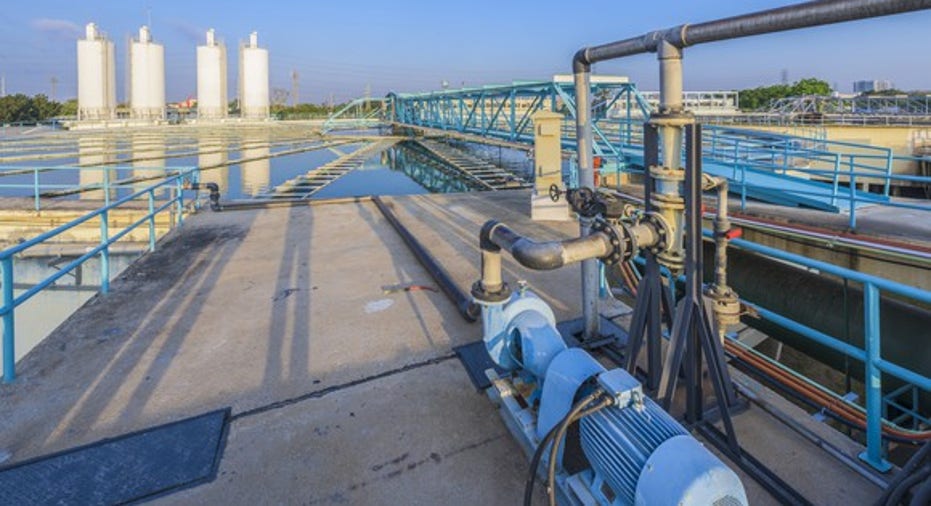Veolia Environnement's 2016 Earnings Send Stock to 3-Year Low

Global water treatment and waste management specialist Veolia Environnement (NASDAQOTH: VEOEY) reported full-year 2016 earnings last week -- and the stock promptly headed for three-year lows. To be fair, last year's performance wasn't exactly the problem. Despite continued currency headwinds, revenue rebounded in the fourth quarter and full-year adjusted net income came in ahead of expectations. Other financial metrics also exceeded the expectations of analysts and even the company itself.
The issue investors had was that management pushed back its profitability targets by one year. That is, rather than aiming to achieve EBITDA of $3.5 billion to $3.72 billion in 2018, the company now expects to hit that watermark in 2019 due to a combination of currency impacts, energy prices, and construction costs. The frustration from a seemingly endless onslaught of headwinds is understandable, but long-term investors shouldn't lose sight of the long-term goals.
Image source: Getty Images.
By the numbers
Before financial performance is discussed, it's important to briefly review the new accounting rule handed down by the International Financial Reporting Interpretations Committee, or IFRIC. Essentially, IFRIC updated how concession contracts with local municipalities are recorded, specifically stating that infrastructure involved in contracts needs to be counted as an intangible asset, a financial receivable, or sometimes a combination of the two. That would seem to have a not-insignificant impact on a company such as Veolia Environnement, which generated 55% of its revenue last year from municipal activities, but the effects are actually quite minimal.
Management reviewed its financial statements dating back to the beginning of 2015 and will retroactively apply the new accounting rule, called IFRIC 12. It resulted in a slight increase in EBITDA for both years, but was offset dollar for dollar by additional expenses. While it does have a slight impact on net income (actually a $0.9 million benefit last year), it's not significant and doesn't impact items such as revenue or net free cash flow. The takeaway: don't panic when you see funny tables of adjustments made to reported earnings.
With that out of the way, let's dig in.
You can check the press release for the full financial metrics, but here are the important numbers from full-year 2016 operations. The company excluded the small impacts from IFRIC 12, and I've done the same to minimize mistakes. The numbers below also adjust for currency exchange rates, which had a negative impact on the results:
Data source: Veolia Environnement.
All in all, Veolia Environnement was able to stave off most headwinds except for currency impacts. Revenue, EBITDA, and diluted EPS were essentially flat. Net income took the biggest hit year over year, mostly attributable to financial capital losses from energy prices and the timing of construction projects. Current net income, the company's non-GAAP metric that excludes financial capital gains, increased 19.3% year over year. However, it's best for investors to stick with GAAP metrics and only use non-GAAP numbers to gauge relative progress through management's eyes.
Importantly for investors, net free cash flow hit a record level and exceeded $1 billion for the first time. Management has proposed to increase the dividend 10% to $0.85 per share as a result. When combined with a weak share price, the dividend will yield roughly 5%.
Additionally, the company exceeded its annual cost savings target by 23%, which prompted management to up its total expected cost savings from 2016 to 2018 from $637 million to more than $850 million. It's not the only change Veolia Environnement made to its financial expectations in the years ahead.
Outlook
Unfortunately, investors will need even more patience in the year ahead. Management has labeled 2017 as a "transition year." While that's not exactly what investors want to hear, the expectations actually aren't that bad. Revenue is expected to begin growing again, EBITDA is expected to remain stable or achieve modest growth, and a revamped cost savings program will see a $265 million decrease in costs. That will be followed by more of the same in 2018, with higher growth and a further $318 million decrease in costs.
And finally, management expects to achieve EBITDA of $3.5 billion to $3.72 billion in 2019 -- the range originally targeted for 2018. A one-year delay is not ideal, but it also shouldn't have much of an impact on long-term investors so long as management executes. In the end, shareholders will own a sharply more efficient business with stronger earnings power and a higher dividend. When you adopt that perspective, the recent sell-off of shares seems pretty nearsighted.
10 stocks we like better than Veolia Environnement (ADR)When investing geniuses David and Tom Gardner have a stock tip, it can pay to listen. After all, the newsletter they have run for over a decade, Motley Fool Stock Advisor, has tripled the market.*
David and Tom just revealed what they believe are the 10 best stocks for investors to buy right now... and Veolia Environnement (ADR) wasn't one of them! That's right -- they think these 10 stocks are even better buys.
Click here to learn about these picks!
*Stock Advisor returns as of February 6, 2017
Maxx Chatsko has no position in any stocks mentioned. The Motley Fool recommends Veolia Environnement (ADR). The Motley Fool has a disclosure policy.



















